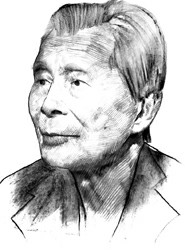|
 Wu Guanzhong[en.expo2010.cn]
Wu Guanzhong[en.expo2010.cn] |
Wu Guanzhong is a contemporary Chinese painter. He has captured in his art a portrait of Chinese architecture, plants, animals, people, landscapes and scenic waters in a style reminiscent of the impressionist painters of the early 1900s. He is also a writer on contemporary Chinese art.
Although almost everyone in the world knows the Eiffel Tower in Paris, few people may realize it was built for the World Expo in that city in 1889. Now, about 120 years later, Shanghai will host a World Expo to promote the progress and well-being of people across the world. This is an event of great honor and significance for us, affording Chinese people the opportunity to contribute our collective wisdom to the advancement of mankind. We want to leave an imprint on human history.
The Eiffel Tower was once derided as a towering monster that besmirched the image of Paris. Many celebrities, led by the novelist Guy de Maupassant, sent petitions to the government urging it be dismantled. It was science that saved the tower; the invention of television gave the structure a new and critical function.
The tallest, the biggest, the longest. People always crave superlatives. Although objects and achievements that offer the greatest wonder and biggest value surely deserve our admiration, it is still vanity that motivates much of our drive to outdo one another. If we compete purely on that basis, the results will be hollow victories.
A World Expo is a venue for showcasing the treasures that mankind has come to value and for offering new ideas that aim to improve people's lives. When people strive for lifestyles of greater enjoyment and luxury, and create happiness through technological development, they run the risk of unleashing forces that could destroy the very existence of mankind. Even when fully apprised of such dangers, most people won't change their thinking or their habits. Natural disasters are often the outcome of human error. We have been hearing loud cries for the protection of nature, the environment and the earth. We must now find practical and effective means of addressing these concerns.
As an ancient Chinese saying goes: "The four fundamentals of a nation are clothing, food, housing and transport." Our ancestors listed "transport" last. However, as people keep flooding into modern-day cities, transport has become a knotty and urgent urban issue. Traffic jams have become omnipresent. Looking down from high-story buildings, we see every street choked with turtle-like vehicles encroaching on the space of pedestrians. Finding a parking space has become the primary concern of car owners. Some cities have become nothing more than gigantic parking lots where vehicles simply cannot move because there are too many of them. Drivers outnumbered pedestrians and hog limited urban space. We are in need of vigorous, scientific development in public transport to solve this problem. Any original thinking and effective measures in this endeavor will greatly benefit cities across the globe.
The gap between nobles and slaves in ancient Rome is a disparity that should have been abolished. Yet some shops still advertise themselves as "friends of the affluent." Sometimes I am seized by the desire to open a "shop for commons" just opposite to compete with them. The focus of the coming World Expo is to study urban development and to try to introduce some of the concepts and conveniences of city life to vast rural areas. At the same time, urbanization of rural areas should be promoted in line with the needs and desires of rural people, with modern communication links a primary consideration. Any city that blindly pursues decadent luxury will collapse sooner or later. Happiness doesn't come from luxury, and luxury is not the equivalent of variety or diversity.
While the development of the automobile industry may provide snarl-free traffic in unpopulated areas, cities must focus their attention on the quality of life for large congregations of people. How can we talk about harmony when there are still huge disparities among our people?
If I were, as I wish, the gatekeeper for a Plato-style "Republic," I would let all bicycles travel freely and totally ban cars, especially limousines, from entering my city.

